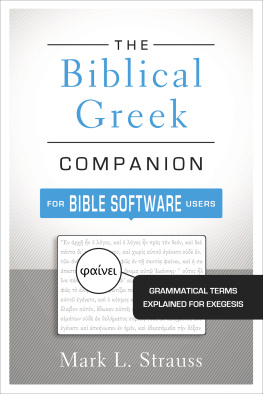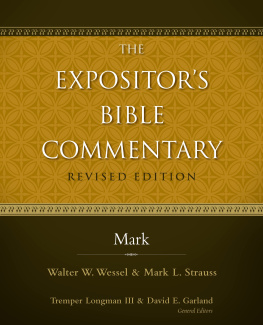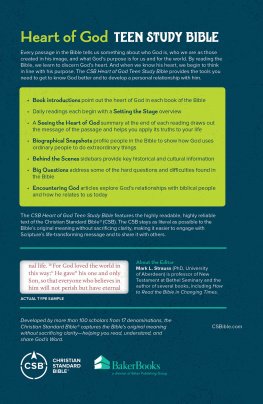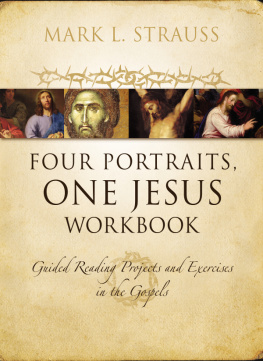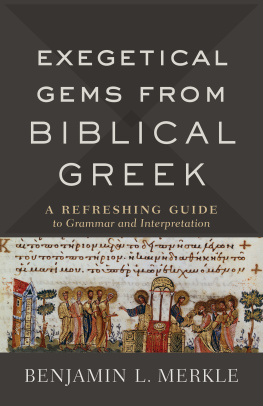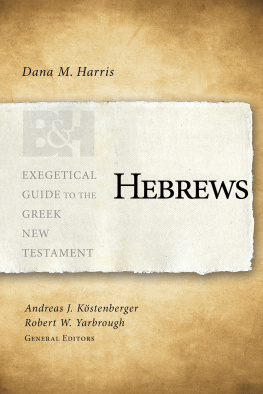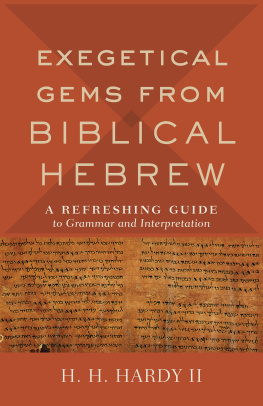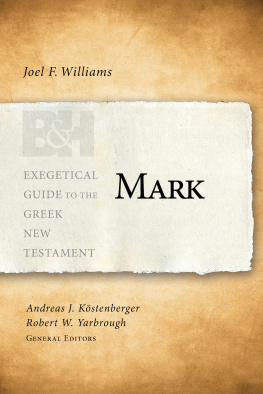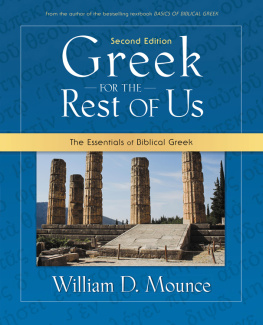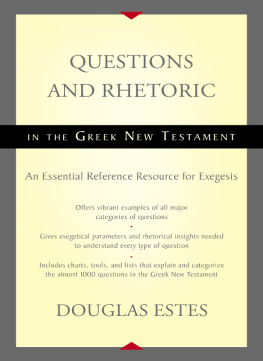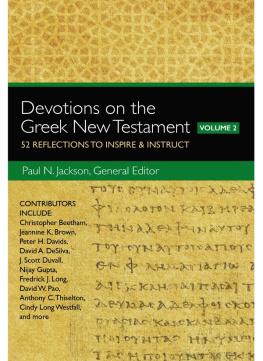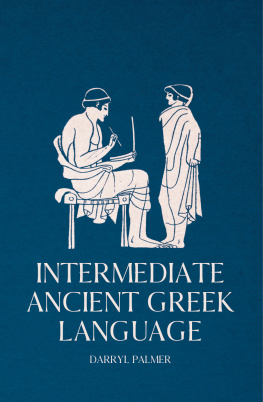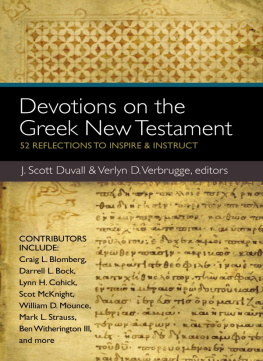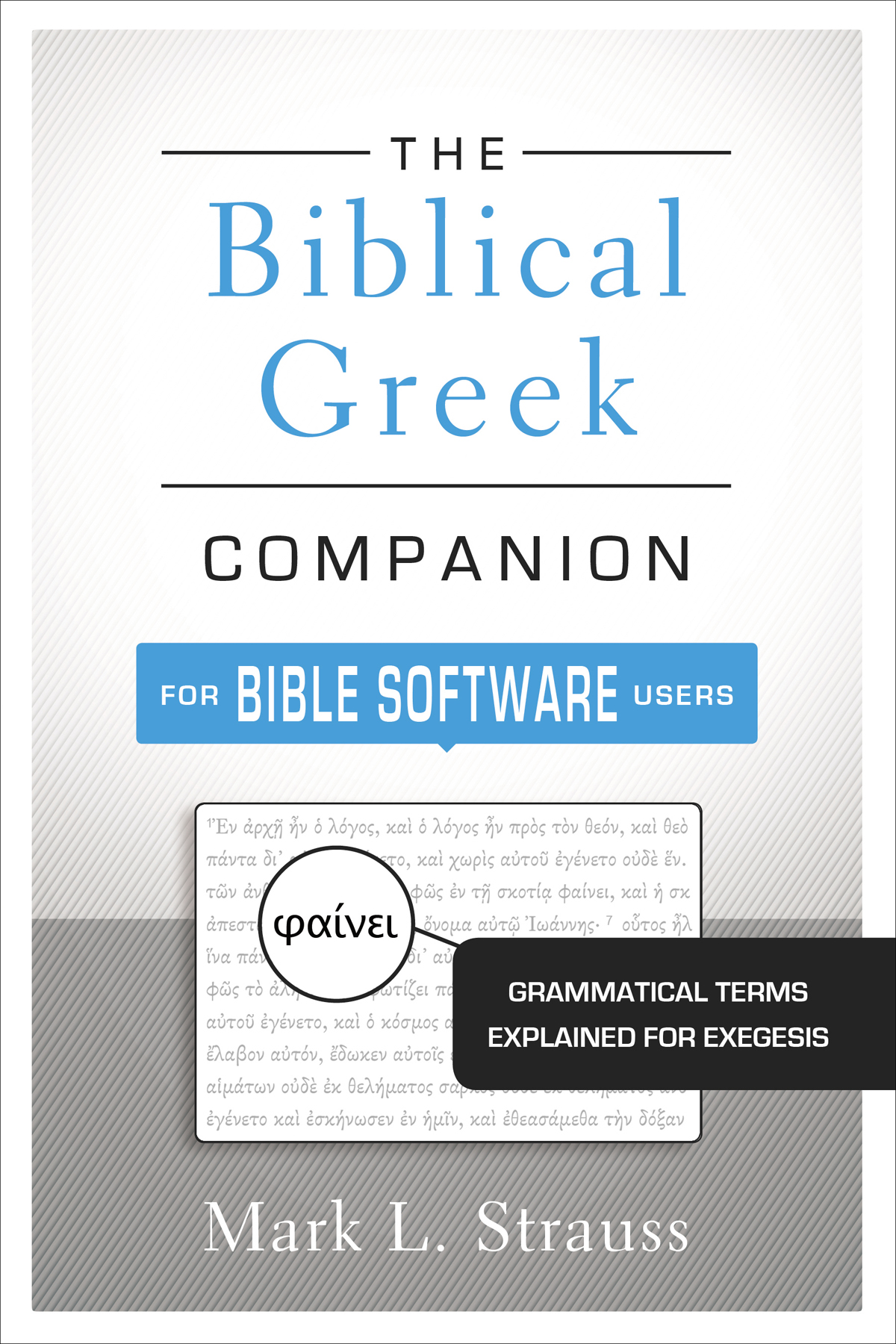
The Biblical Greek Companion for Bible Software Users
Grammatical Terms Explained for Exegesis
Mark L. Strauss

ZONDERVAN
The Biblical Greek Companion for Bible Software Users
Copyright 2016 by Mark L. Strauss
This title is also available as a Zondervan ebook.
Requests for information should be addressed to:
Zondervan, 3900 Sparks Dr. SE, Grand Rapids, Michigan 49546
ePub Edition September 2016: 978-0-310-52135-8
Library of Congress Cataloging-in-Publication Data
Names: Strauss, Mark L., 1959- author.
Title: The Biblical Greek companion for Bible software users : grammatical terms explained for exegesis / Mark L. Strauss.
Description: Grand Rapids, MI : Zondervan, 2016. | Includes bibliographical references and index.
Identifiers: LCCN 2016018455 | ISBN 9780310521341 (paperback)
Subjects: LCSH: Greek language, BiblicalComputer-assisted instruction. | Greek language, BiblicalSelf-instruction. | BibleLanguage, styleComputer-assisted instruction. | BibleLanguage, styleProgrammed instruction.
Classification: LCC PA817 .S78 2016 | DDC 487/.4dc23 LC record available at https://lccn.loc.gov/2016018455
All Scripture quotations, unless otherwise indicated, are the authors own.
Scripture quotations marked as NIV are taken from The Holy Bible, New International Version, NIV. Copyright 1973, 1978, 1984, 2011 by Biblica, Inc. Used by permission of Zondervan. All rights reserved worldwide. www.Zondervan.com. The NIV and New International Version are trademarks registered in the United States Patent and Trademark Office by Biblica, Inc.
Any Internet addresses (websites, blogs, etc.) and telephone numbers in this book are offered as a resource. They are not intended in any way to be or imply an endorsement by Zondervan, nor does Zondervan vouch for the content of these sites and numbers for the life of this book.
All rights reserved. No part of this publication may be reproduced, stored in a retrieval system, or transmitted in any form or by any meanselectronic, mechanical, photocopy, recording, or any otherexcept for brief quotations in printed reviews, without the prior permission of the publisher.
Cover design: FaceOut Studio
CONTENTS
Technological advances have provided a remarkable array of resources for those who have an interest in a deeper study of Scripture in its original languages. Programs such as Logos Bible Software, Accordance Bible Software, BibleWorks, and others have revolutionized the way we study Gods Word. For example, right now I have a Bible software program open on my laptop. I see in parallel columns the Greek text of the passage I am studying, together with three English translations, each providing a slightly different perspective on the meaning of the text. I also have open two electronic commentaries on the passage: when I scroll down in my Bible, the commentaries automatically move to a discussion of those same verses. I no longer need a concordance, since I can type a wordwhether in English, Hebrew, or Greekin a search window and instantly find every use of that word in the Bible. I no longer need my Greek paradigm charts, since I can pass my cursor over any Greek verb and it will instantly parse it for me: tense, voice, mood, person, number. With another click, I can open two or three Greek lexicons that will provide detailed data on the various functions and senses of the word. I can do advanced searches of that word to see every place in which it occurs with other words or phrases. This is remarkable!
Yet while Bible software provides users with an abundance of useful information, it unfortunately does not provide them with an explanation of what most of that information means or its significance for understanding biblical texts. For most of us, it has been a long time since we had formal training in English grammar (if we ever had it!). And for those who have studied the biblical languages, much of its terminology is now forgotten. So when a Greek language program informs us, for example, that a word is a vocative, or a genitive, or a subjunctive, or a middle voice, we do not remember (or perhaps have never learned) what these grammatical terms mean.
The Biblical Greek Companion for Bible Software Users provides studentsin an alphabetically arranged formatwith simple and clear explanations of the basic grammatical terms that they are likely to encounter in their Bible software. To make this resource as user-friendly as possible, each entry provides (1) a description of what the form looks like, (2) a summary of what it does, that is, its main functions (with examples from the Greek New Testament), and (3) an Exegetical Insight to show how the grammar will help us interpret the text.
This resource is designed as an aid to anyone who works with New Testament Greek, and especially those who own and use a biblical Greek software program. Intended readers include:
- pastors and other ministry leaders who may have learned biblical Greek at one time, but have experienced the loss of much of that learning because of the time demands of life and ministry;
- college and seminary students who are engaged in a biblical Greek language course, but who could use this resource as a supplement to provide easily accessible and simplified explanations, along with clear biblical examples;
- college and seminary students who are enrolled in an academic program that no longer requires them to learn the biblical languages, but who wish to have access to the wealth of available resources for original-language study;
- those who have never had the opportunity, resources, or inclination to learn the paradigms, vocabulary, grammar, and syntax of biblical Greek, but would still like to benefit from the deeper insights into the Bible that Greek study can provide.
acc. | accusative |
act. | active |
adj. | adjective |
adv. | adverb |
aor. | aorist |
BDAG | Bauer, W. A Greek-English Lexicon of the New Testament and Other Early Christian Literature. Translated and revised by W. F. Arndt, F. W. Gingrich, and F. W. Danker. 3rd ed. Chicago: University of Chicago Press, 2000. |
BDF | Blass, F., and A. Debrunner. A Greek Grammar of the New Testament and Other Early Christian Literature. Translated and revised by R. W. Funk. Chicago: University of Chicago Press, 1961. |
BECNT | Baker Exegetical Commentary on the New Testament |
CEB | Common English Bible |
CEV | Contemporary English Version |
dat. | dative |
decl. | declension |
e.g. | for example |
ESV | English Standard Version |
fem. | feminine |
fut. | future |
gen. | genitive |
GW | Gods Word translation |
HCSB | Holman Christian Standard Bible |
Next page
